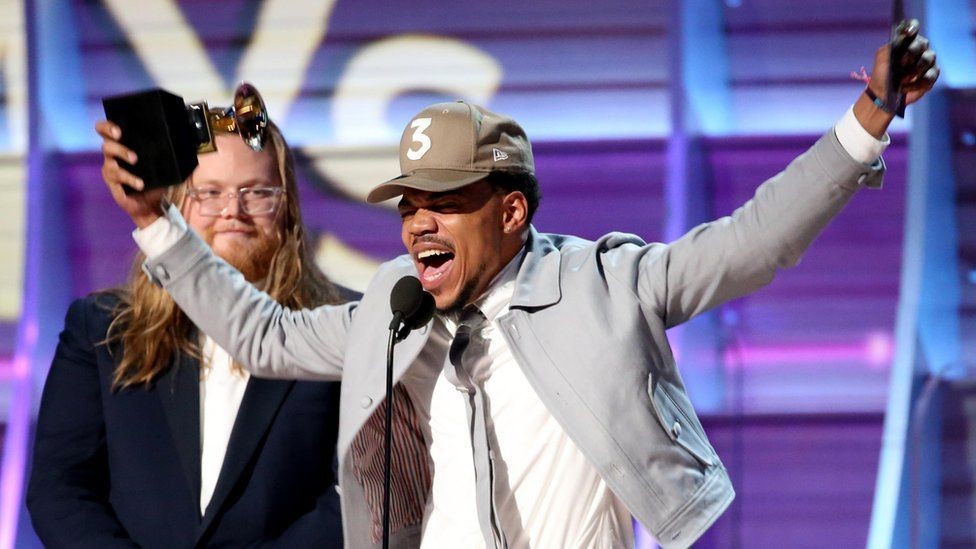
When the rhythm and blues artist R. Kelly revisited his old Chicago South Side neighborhood Hyde Park in 2005, he brought his basketball.
A summer camp for inner-city kids had heard Kelly loved the sport and asked if he would come to their gym, play ball with the kids, and teach them the power of self-reliance. When Kelly showed up one day — wearing Jordans and surrounded by a four-man entourage — the camp played five shrimpy kids against him and his bar bouncer-sized goons. Outmatched, the kids quickly gave up.
“Y’all played like trash out there,” Kelly said afterwards. “I beat you good — cuz I’m the greatest and you nothing.”
Then he threw the ball at the rim and left.
This behavior is typical of musicians whose talent helps them move out of the inner-city and into the national spotlight. However, we saw a different side of the South Side when Chance the Rapper, who hails from Chatham, won Best New Artist, Best Rap Performance, and Best Rap Album at the Grammys on Feb. 11. Instead of praising himself — as is common in the rap game — Chance called his talent and popularity a blessing from God.
Chance isn’t the first artist to do this. But he may be the first nationally popular rapper to thank God constantly in his work. Before he accepted his awards, Chance performed the song “How Great,” from his new album “Coloring Book.” Chance interpolated lyrics from the popular gospel hymn, “How Great is Our God,” and performed the song with a full gospel choir decked out in white robes. Like all of the songs on “Coloring Book,” “How Great” gives glory to God and celebrates childlike faith.
The Grammy performance is scripted and rehearsed, but Chance’s actions later in the show leave little room to doubt his sincerity. When he received the award for Best Rap Album, Chance thanked God again.
“I didn’t think we were going to get this award, so I didn’t have anything prepared,” he said. But I want to thank God for everything that He’s accomplished for me, for everything that He went through with me.”
Chance went on to thank other people — his parents, his friends, and all the indie artists out there — but by putting God first, he humbled himself before a higher power.
Chance stands in contrast to a number of artists — especially rappers from Chicago’s South Side — who develop unbearable egos because of their talents. R. Kelly is old example — he soiled his public reputation long ago. But more recently, a whole new host of South Side egomaniacs have crowded the field — Kanye West, Chief Keef, Joey Purp — who thank no one but themselves for their success.
It’s not just Chicago. Nearly every popular entertainer in recent history has had an ego problem that bleeds through our TVs at awards ceremonies. Brooklyn rapper Ol’ Dirty Bastard drew attention to himself by shouting “Wu Tang is for the children!” when he didn’t get his Grammy in 1998. We all know the story of Kanye West and Taylor Swift at the VMAs in 2009.
But the egomania of the music industry may have peaked at this year’s Grammys, even amid Chance’s humility.
When British singer Adele’s album “25” trumped Beyoncé’s “Lemonade,” in the top award categories, insiders called foul. In nearly everyone’s minds, these awards belonged to Beyoncé because her music was brash and revolutionary. On the other hand, Adele’s music panders to the J.K. Rowlings of mommy-blogs.
Queen Bey supporters stepped up with fiery social media posts. Slate magazine condemned Adele for being a symbol of sorry-not-sorry white-guilt. Even Adele was upset: She apologized on stage to Beyoncé and broke the award in half, a failed attempt to restore the Beyoncé’s stolen honor.
From afar, the whole affair seemed wrapped an eerie we’ve-seen-this-before haze. Whether it be the Beyonce Adele boondoggle, or Cee Lo Green’s all-gold costume of himself, or Joy Villa’s “Make America Great Again” dress — there’s always a distasteful shade of soapbox-preaching or navel-gazing at the Grammys.
Thank God for Chance keeping it simple and thanking God. Someone needed to stop the madness.

